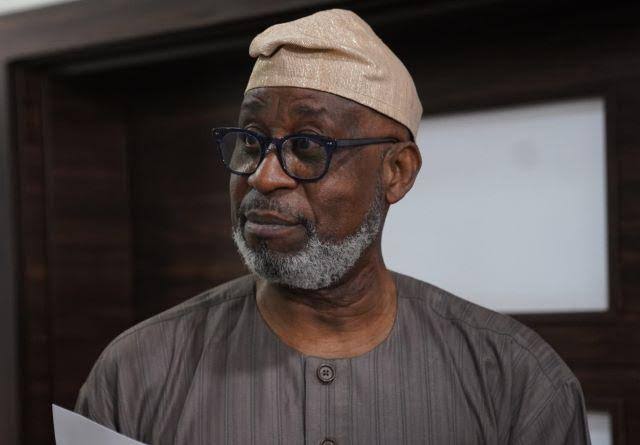In order to effectively protect the country’s mineral riches, the Federal Government has approved the deployment of an additional 350 mining marshals to various regions of the nation.
This came as Dele Alake, the Minister of Solid Minerals Development, stated that the federal government’s commitment to regulating the mining industry is demonstrated by the appointment of more personnel to the mining marshals.
Recall that the government appointed 2,220 mining marshals in the first batch earlier this year in order to secure mining sites.
The federal government has forfeited illegally mined minerals, and over 200 suspects in illegal mining have been arrested. Additionally, 133 charges are pending, according to Segun Tomori, the minister’s personal assistant on media.
Speaking at the NSCDC headquarters in Abuja during the Passing Out Parade for new operatives, the minister, represented by Permanent Secretary Mary Ogbe, praised the Nigeria Security and Civil Defence Corps and his interior counterpart, Olubunmi Tunji-Ojo, for their cooperation in battling illicit mining.
The minister highlighted the achievements of the mining marshals, pointing out that the nation’s unlawful mineral haulage and unlicensed operators’ operations have been drastically curtailed as a result of their efforts.
“Today’s Passing Out Parade of the second batch will further increase our numbers, ensuring wider coverage and enhancing the operational effectiveness of the squad.
“As we integrate and improve collaboration between mining marshals and Federal Mines Officers across the country, we aim to intensify sector sanitization and boost investor confidence, leading to increased investments and development in the mining industry,” Dr. Alake stated.
The new agents completed a rigorous 8-week training programme, according to NSCDC Commandant-General Abubakar Audi, who made these revelations during his speech. This training equipped them to bolster the operations of mining marshals and ratchet up efforts against illicit miners across the country.
In the meantime, in order to guarantee a significant contribution to the country’s Gross Domestic Product, the Nigeria Solid Minerals Development Fund has declared that it is prepared to thoroughly investigate the wealth of solid mineral resources found there.
The guarantee was given in a statement released on Friday after a training programme intended to improve Nigerian geoscientists’ ability to use remote sensing technology for geological mapping and mineral exploitation. The statement was signed by Idowu Jokpeyibo, Head of Corporate Communications.
According to Jokpeyibo, the training was conducted in accordance with a Memorandum of Understanding with Berlin, Germany’s GeoScan GmbH in order to further the exploration and development of Nigeria’s critical minerals utilising cutting-edge, exclusive technology.
This occurred in October 2023, during the German Chancellor’s visit to the nation.
Participants have a thorough understanding of remote sensing technology thanks to Neil Pendock, an expert in image processing, who led the workshop.
The expert noted that the world’s most well-known mining nations, including Australia, Canada, and South Africa, have been using the technology as a cost-saving technique.
Pendock went on to say that the training for the Nigerian solid minerals industry would result in the supply of top-notch geoscience data required to establish Nigeria as a mining investment destination worldwide.
He said in saving exploration costs, Remote Sensing Imagery would also save time compared with the length of time needed when regular exploration methods are used stressing that, “It will place Nigeria at great advantage as it will save the country huge costs in mineral exploration.”
With more than 40 years of experience in the field of remote sensing, Pendock claimed that using satellite imagery to remotely choose activity photographs is a more effective way to explore minerals and tackle Nigeria’s problems with illicit mining.
He said that Nigeria, with its stable democracy and wealth of mineral resources, could compete with other countries with similar resources as long as its data was transparently organised through the use of remote sensing technology. He thought this was a goal that could be easily attained and recommended that the government give priority to environmentally friendly mining practices in order to attract investment.
Pendock underlined the use of thermal data even more in geological mapping, pointing out that it can be used to locate mineral reserves that are hidden by vegetation.
“Thermal data is very useful because it works at night when the rocks cool down and release thermal energy, allowing us to detect different minerals, even those that are undercover or beneath vegetation.”
According to him, insufficient geological mapping has left numerous mineral resources unexplored, which has led to missed chances for economic development.
Speaking about the workshop’s main points, Mr. Kefas Malgwi, Head of the SMDF’s Mineral Exploration Department, said the training is timely, would enhance the country’s exploration efforts, and would allow it to find resources of the highest calibre that would draw in investors.











